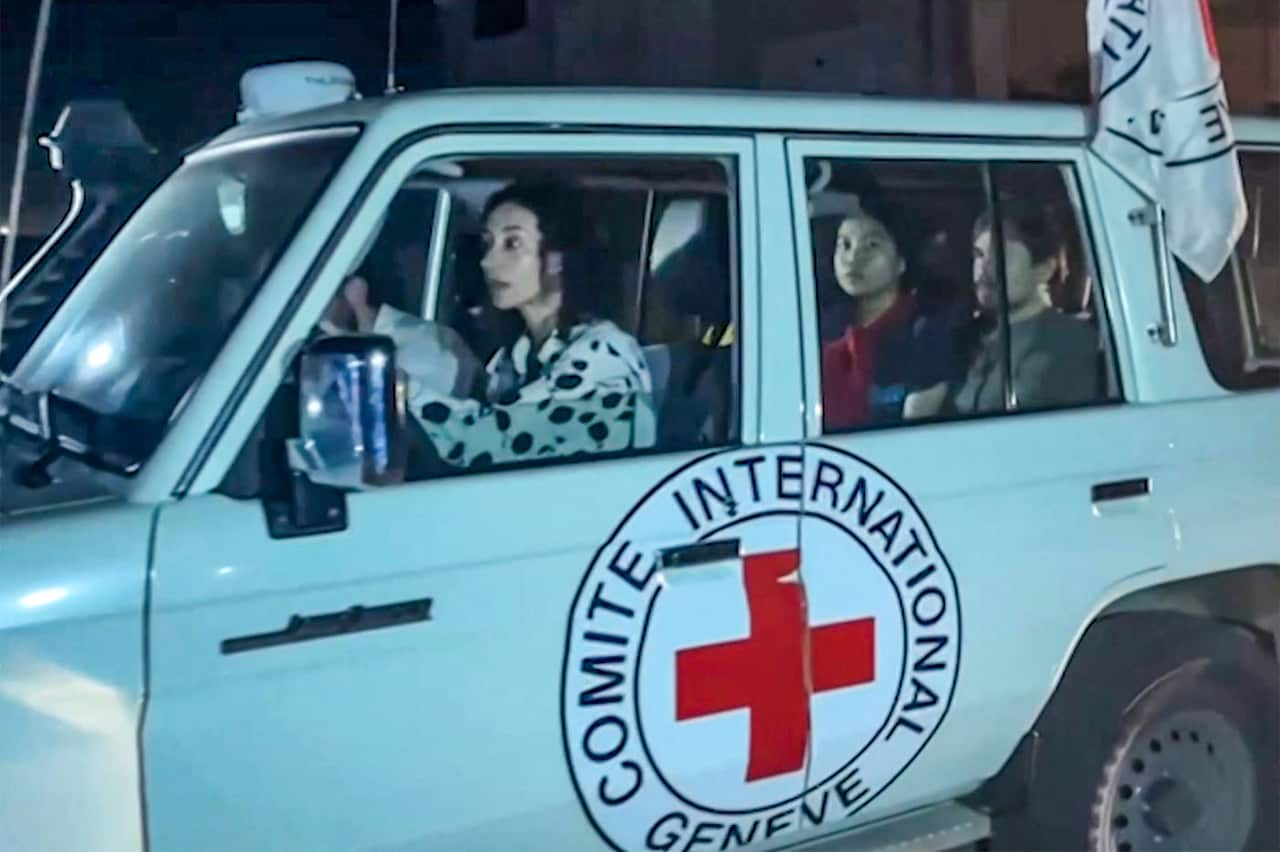Key Points
- Hamas freed 24 hostages from Gaza on the first day of the truce, while Israel released 38 Palestinians.
- Biden says there was a "real" chance of extending the truce.
- The UN humanitarian office said 137 trucks of goods offloaded in Gaza, the biggest convoy received since 7 October.
Israel has received a list of hostages to be freed from Gaza on Saturday by Palestinian militant group Hamas, officials said, following the release of 24 hostages the previous day, the first of a planned four-day truce.
Israeli security officials were reviewing the list, the office of Prime Minister Benjamin Netanyahu said in a statement, after his government's vow to work for the release of all in
The pause in the fighting was the first such break, with both sides saying hostilities would resume as soon as the truce ends. United States President Joe Biden expressed hope the pause could be extended, however.
The released hostages, including Israeli women and children and Thai farm workers, were transferred from Gaza and handed to Egyptian authorities at the Rafah border crossing, along with eight staff of the International Committee of the Red Cross in a four-car convoy, the organisation said.
They were then taken to Israel for medical checks and reunions with relatives.

An International Red Cross vehicle reportedly carrying hostages released by Hamas crosses the Rafah border point in the Gaza Strip towards Egypt on Friday. Source: Getty / AFP
Some . The freed Israeli hostages included four children accompanied by four family members and five elderly women.
Joe Biden, Anthony Albanese welcome temporary ceasefire
Biden said there was a "real" chance of extending the truce, adding that the pause was a critical opportunity to get humanitarian aid into Gaza.
He declined to speculate how long the Israel-Hamas war would last. Asked at a press conference what his expectations were, he said Israel's goal of eliminating Hamas was legitimate but difficult.

Doron Katz and her daughters, Aviv and Raz Asher Katz (right), were also released by Hamas on Friday. Source: AAP
"Australia welcomes the release of hostages and the pause in hostilities to allow humanitarian access to Gaza," Albanese said on social media platform X.
"Today’s developments represent important progress and Australia welcomes them."

Palestinian prisoners (centre) released from the Israeli Ofer military facility in exchange for hostages freed by Hamas in Gaza on Friday. Source: Getty / AFP
About 1,759 trucks have entered the narrow enclave since 21 October, it added.
The World Health Organization helped transfer 22 patients from al-Ahli Hospital to the south on Friday, its chief Tedros Adhanom Ghebreyesus said on social media platform X.
"To meet all the health needs in Gaza, much more support is needed and above all sustained ceasefire," he said.
Mixed emotions after hostage-for-prisoner swap
The families of the hostages expressed mixed emotions, fearing for those left behind.
"I'm excited for the families who today are going to hug their loved ones," Shelly Shem Tov, the mother of Omer Shem Tov, 21, said in an interview with Israel's Channel 12, although he was not among those released on Friday.
"I am jealous. And I am sad. Mostly sad that Omer is still not coming home."

Keren Munder and her son Ohad were two of the hostages, among several others, who were freed by Hamas on Friday. Source: AAP / AP
Those released on Friday were exchanged for 24 jailed Palestinian women and 15 teenagers. In at least three cases, before the prisoners were released, Israeli police raided their families' homes in Jerusalem, witnesses said.
"There is no real joy, even this little joy we feel as we wait," said Sawsan Bkeer, the mother of 24-year-old Palestinian prisoner Marah Bkeer, jailed for eight years on knife and assault charges in 2015.

Marah Bkeer (left) a Palestinian detained in Israeli prison for eight years and released on Friday. Source: Getty / AFP
"We are still afraid to feel happy and at the same time, we do not have it in us to be happy due to what is happening in Gaza," she added.
A source briefed on the talks said the release of the Thai workers was unrelated to the truce talks and followed a separate track mediated by Egypt and Qatar. Thailand's government said 20 of its nationals remained captive.
The heavy toll of war after seven weeks
Israeli tallies show Hamas fighters killed 1,200 people in the October attack and took about 240 hostages.
Since then, Israel has rained bombs on the Hamas-ruled enclave, killing about 14,000 Gazans, roughly 40 per cent of them children, Palestinian health authorities say.
Hundreds of thousands of Gaza's 2.3 million people have fled their homes, including most of those in its northern half.
The Palestinian Journalists Syndicate estimates as many as 66 media representatives were killed, including six women journalists, with two missing in Gaza since 7 October.
Charges of war crimes have been exchanged on both sides, with Palestinians accusing Israel of targeting civilians and Israel saying militant groups like Hamas use civilians as human shields.
Hamas is , which has gained power in the Gaza Strip since winning legislative elections there in 2006. Its stated aim is to establish a Palestinian state, while refusing to recognise Israel's right to exist.
Hamas, in its entirety, is designated as a terrorist organisation by countries including Australia, Canada, the United Kingdom and the United States. New Zealand and Paraguay list only its military wing as a terrorist group.
In 2018, the United Nations General Assembly voted against a resolution condemning Hamas in its entirety as a terrorist organisation.









